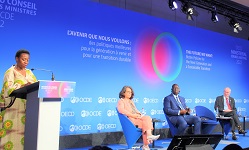At the Africa Forum held in Paris, France, African and international leaders call for boosting Africa’s regional production networks to create more jobs
The COVID-19 pandemic has derailed progress on Africa’s development efforts and pushed more than 29 million people into extreme poverty. Fast and challenging mutations in the global economy are reshaping the context for Africa’s economic transformation. The consequences of the Russia-Ukraine conflict has exacerbated food insecurity and instability; and could weaken Africa’s recovery.
Meanwhile, it is urgent to maintain open markets, refraining from export restrictions, and allowing grain and fertilizers to reach the countries in need. These measures must go hand in hand with actions to reduce the vulnerabilities of African economies. In particular, investing in local production and empowering SMEs in the transformation of African agriculture and industry is crucial to build resilience and generate decent, quality jobs for a young, fast expanding population.
“Stronger investment and trade links within Africa can drive production transformation, growth and employment generation: they should be a priority of the continent’s evolving international partnerships”, reaffirmed Ragnheiður Elín Árnadóttir, Director of the OECD Development Centre, welcoming the strong and expanding cooperation with the African Union and its member countries.
To achieve a fast, sustainable and job-rich recovery, the continent needs stronger networks of African firms that buy goods from regional suppliers and re-export higher value-added products, in the context of the African Continental Free Trade Area (AfCFTA).
“African countries need to act decisively not to miss out on their economic recovery. In this context, mobilising massive investments and harnessing digital technologies in the production value chain are essential to transform African economies to achieve Agenda 2063 and address youth unemployment,” said Albert Muchanga, Commissioner for Economic Development, Trade, Tourism, Industry & Minerals of the African Union Commission.
According to the 2022 edition of Africa’s Development Dynamics, the flagship economic report of the African Union Commission, produced with the OECD Development Centre and the support of the European Union, intra-African value chains represent only 2.7% of Africa’s global value chain participation, significantly lower than in Latin America and the Caribbean (26.4%) or in developing Asia (42.9%).
The report provides evidence from case studies and formulates specific policy recommendations for each of Africa’s five regions. It identifies two overarching policy priorities to support regional production networks:
· Reducing the cost of producing regional goods, notably by accelerating the digitalisation of intra-African trade. This requires more and better regional Internet infrastructure, as well as easier regulations on cross-border data flows;
· Adapting national industrialisation strategies to the new AfCFTA environment, by developing skills for each segment of a strategic value chain and encouraging intra‑regional skills mobility; modernising and broadening Africa’s already large public procurement programmes; and attracting investment from lead firms into regional production networks and infrastructure.
Africa’s Development Dynamics was discussed today on the occasion of the 21st International Economic Forum on Africa: “Africa in the emerging global economic order”, which was opened by Macky Sall, President of the Republic of Senegal and Chairperson of the African Union; Jeffrey Schlagenhauf, OECD Deputy Secretary-General; Monique Nsanzabaganwa, Deputy Chairperson of the African Union Commission; Albert Muchanga, African Union Commissioner for Economic Development, Trade, Tourism, Industry and Minerals; and Marina Sereni, Vice Minister of Foreign Affairs and International Co-operation of Italy, and Chair of the OECD Ministerial Council Meeting.
High-profile leaders from Africa as well as from OECD and non-OECD countries gathered in Paris to share their experiences and visions with more than 500 Forum participants. The 21st edition of the Forum takes place in the framework of the OECD Ministerial Council Meeting (MCM), chaired by Italy, on the theme “The Future We Want: Better Policies for the Next Generation and a Sustainable Transition”.
Discussions covered the pressing challenges of fast rising food and energy prices, and how to reduce the continent’s dependence on raw material exports, advance productive transformation and increase investment and domestic resource mobilisation.
